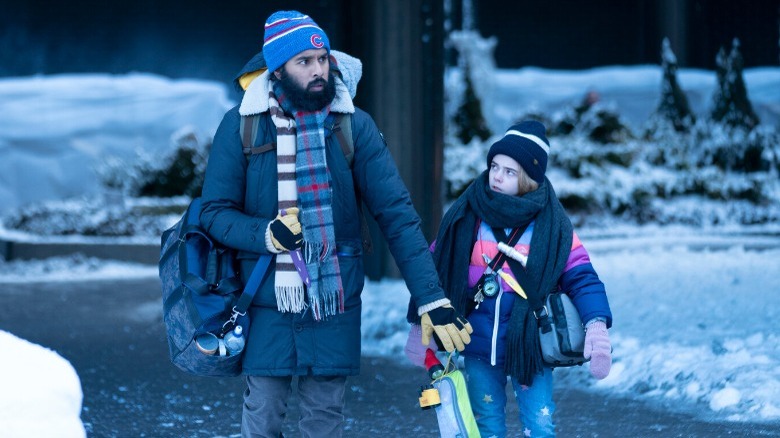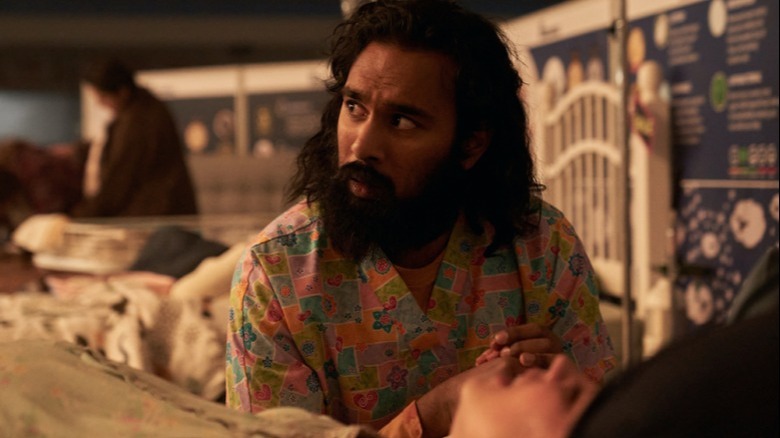Himesh Patel's Station Eleven Performance Goes Beyond The Emmys
"Station Eleven" was never going to be the kind of show that sweeps the Emmys. I knew this when I heard that Emily St. John Mandel's much-loved book about a post-apocalyptic theater troupe was getting an adaptation. I knew it when I watched the show and felt my heart shatter, rebuild, and expand in real time. And I knew it when the Emmy nominations came out, with the series' recognition largely relegated to the creative categories (which deserve as much acclaim as the performances, to be clear).
But "Station Eleven" is a show about hope — fragile and tentative, yet ever-evolving — so I'll forgive myself for still hoping Himesh Patel might have been recognized by something as silly as an award show tonight for his profound turn as Jeevan Chaudhary. Perhaps it's only appropriate that his performance as man who spontaneously becomes a child actor's caretaker during the height of a global pandemic remains a joy that exists only for those who look for it. After all, that's also what "Station Eleven" is about: the graphic novels and plays and friendships and countless little things that bind us together and keep us going, but only when the world tilts just right, so that we can discover and understand them.
Jeevan and Kirsten
All this is to say, in so many lofty words (sorry, too much Shakespeare), that Patel gives a hell of a performance in "Station Eleven," and it's one I hope people discover with or without an Emmy to show for it. In Mandel's book, Jeevan is an interesting character, but he's not nearly as integral as his on-screen counterpart becomes. He witnessed the heart attack that is the story's inciting incident, but soon becomes just one person in a larger ensemble of survivors.
The show, though, sets up a split-second decision in its first episode — Jeevan's choice to walk young Kirsten (Matilda Lawler) home, then stay with her while the world comes apart at the seams — that causes a seismic shift in the story. Slowly but surely, much of the focus of "Station Eleven" becomes the world these two unlikely friends built together, a world that's as sad and loving and stubborn and true a representation of pandemic lockdown as any I've ever seen.
To be seen, and remembered
Despite its technical recognition, "Station Eleven" isn't an Emmys-type show, just like the all-time-great series some of its writers graduated from, "The Leftovers," wasn't an Emmy-type show. It's easier to reward the external than the internal, no matter how transformative the internal may be. It's easier to explain a show about murder, or divorce, or the opioid epidemic, than it is to sell people on a show about the unadulterated awe of witnessing your depressed brother freestyle rap while your fingers are half-frozen, or the strange, exhausted pride of helping to deliver a half-dozen babies in a row, or the disbelieving joy of seeing someone who meant everything to you, safe and whole, years after you abruptly parted ways.
Patel communicates all of this and so much more in "Station Eleven," in a performance that's quite simply unforgettable to anyone who's seen it. His ferociously heartfelt scene partners, including Lawler, Nabhaan Rizwan, and Mackenzie Davis, also all but tear a hole in the sky with their tremendous work on the show.
"First we only want to be seen," Mandel wrote in her novel. "But once we're seen, that's not enough anymore. After that, we want to be remembered." And isn't that the truth? Awards or no awards, I can sleep easy knowing that "Station Eleven" is among the most singular work of art in recent years — one that will, no doubt, be remembered.


